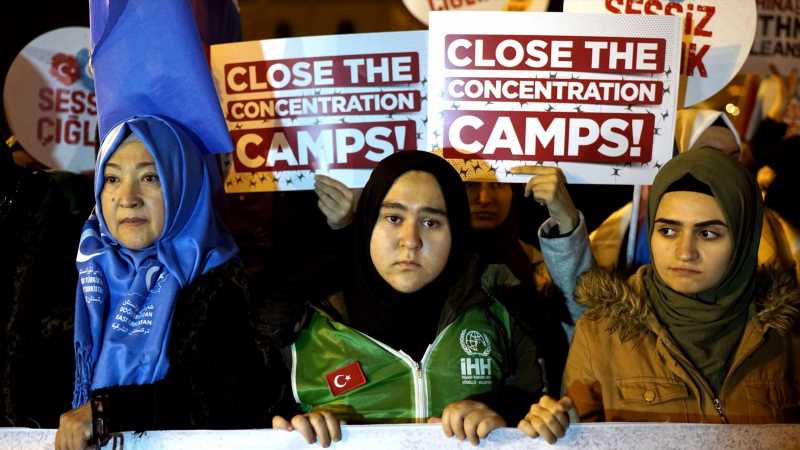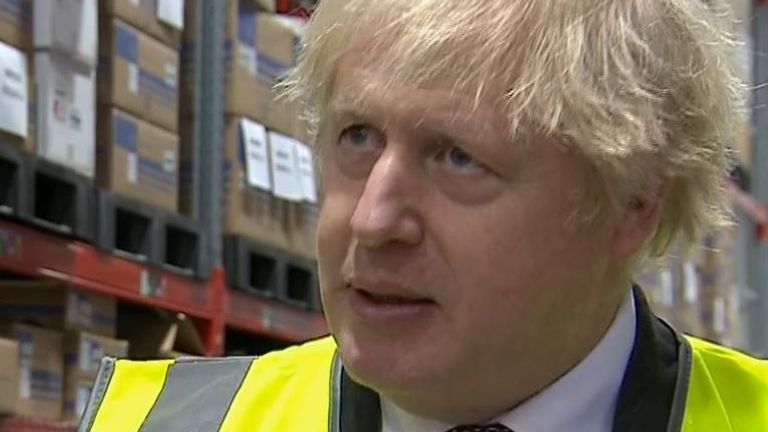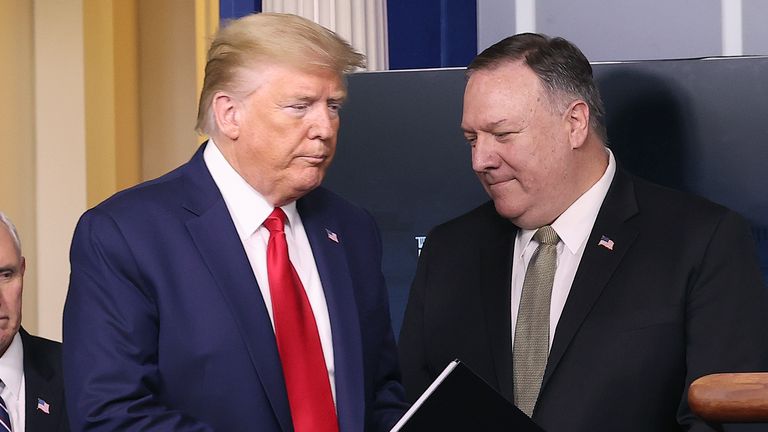Boris Johnson has narrowly won a vote to let the UK strike trade deals with countries that are committing genocide.
The prime minister failed to quell a substantial Tory rebellion over the issue – with 33 of his own backbenchers voting with Labour and other opposition parties.
But he managed by a slim margin to scrap the amendment to the Trade Bill added by the House of Lords, winning a division by 319 to 308.
The move is awkward timing for the government, coming hours after outgoing US Secretary of State Mike Pompeo said China‘s treatment of Muslims and ethnic minorities in the Xinjiang region constitutes genocide.
Despite the amendment being defeated, former Tory leader Iain Duncan Smith – one of the rebels – said he hoped peers would “ensure an improved amendment returns to the Commons”.
He added: “The willful ignorance of alleged genocide and grave human rights abuses in China and elsewhere must stop.
“We will not sell out our values for trade deals with genocidal states.”
Speaking in the Commons, Mr Duncan Smith added Uighurs and other victims of alleged genocide “have been denied justice for many many years” and face being pushed into slave labour and forced sterilisation.
“It’s quite clear to me – but I’m not able to say so – that this has all the hallmarks of a genocide.
“I’m not able to say so, because at the end of the day it’s for the courts to make that decision, it’s not for individual politicians to do so.”
Other senior Conservatives to rebel were former cabinet ministers David Davis and Damian Green.
Tory MP Tobias Ellwood, who chairs the Commons’ Defence select Committee, explained why he was voting against the government, saying: “We are just crafting the definition of what global Britain means and this must be front and centre in what we stand for and what we believe.”
The amendment would have let the High Court decide a country that signed up to a trade deal with Britain had committed genocide under the UN Convention on the Prevention and Punishment of the Crime of Genocide – revoking the agreement.
During the debate, trade minister Greg Hands said he wanted “further discussions” with MPs on how to approach their concerns.
But he angered them by admitting he had not read a compromise amendment, which was tabled by Sir Iain and Conservative MP Nusrat Ghani and designed to avoid a rebellion by containing the thrust of proposals introduced by peers while easing government concerns.
Mr Hands said he will “have to have a look at the amendment” before Sir Iain replied that he had handed it to Foreign Secretary Dominic Raab and his team last Wednesday and added: “With respect, it’s not a case of will he have a look at it, he must have a view about it surely because it’s there.”
In the Commons last week, Mr Raab dismissed the amendment as “well-meaning” but also “rather ineffective and counter-productive”.
Analysis: Another showdown coming soon with potentially even more rebels
By Jon Craig, chief political correspondent
During the big Commons vote on genocide and trade with China, the burly, ruddy-faced figure of Mark Spencer, the government chief whip, sat slumped in his corner seat on the front bench looking worried.
And well he might. When his deputy, the affable Stuart Andrew showed him a piece of paper with the result, it revealed that the government – with a hefty Commons majority of 80, don’t forget – had scraped home by just 11 votes.
The reason: a bruising rebellion, including some big names and several former Cabinet ministers, that will ring alarm bells in Downing Street and the Foreign Office and means this row isn’t over.
After this narrow defeat, one of the leading rebels told Sky News: “We’ve got them just where we want them, a handful of votes short. It means the Lords will be emboldened to take on our amendment.”
So stand by for a repeat of this showdown in a few weeks’ time, when – potentially – the Tory rebellion could be even bigger and the Government could face the real prospect of a humiliating Commons defeat.
The scale of the rebellion also demonstrates that the so-called “China Hawks” on the Tory back benches are a powerful lobby in the Commons and the government may have to make significant concession to them.
This sizable rebellion also dwarfs the rebellion by just six Tory MPs 24 hours earlier on Universal Credit. It shows what issues Conservative backbenchers care about.
Source: Read Full Article



